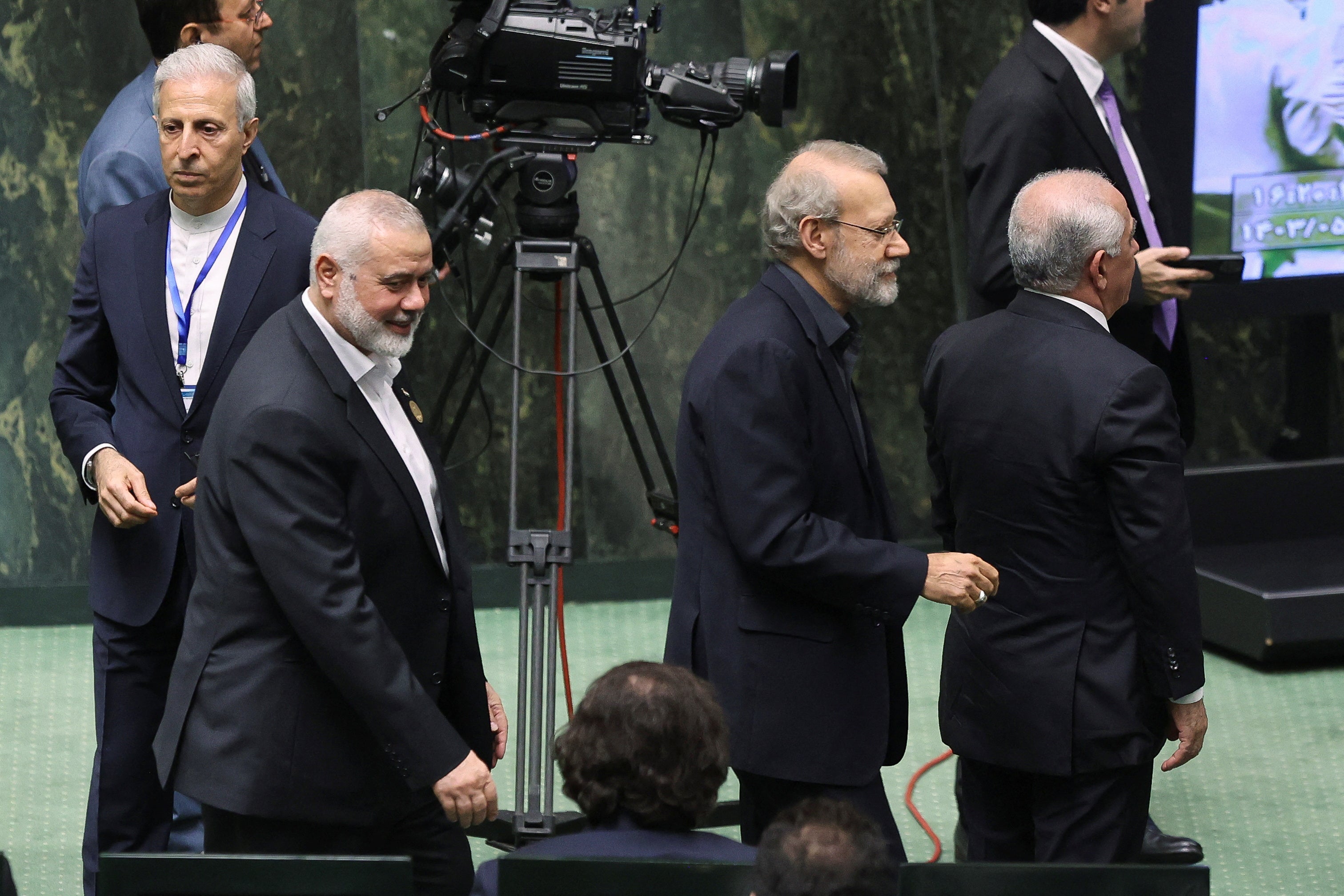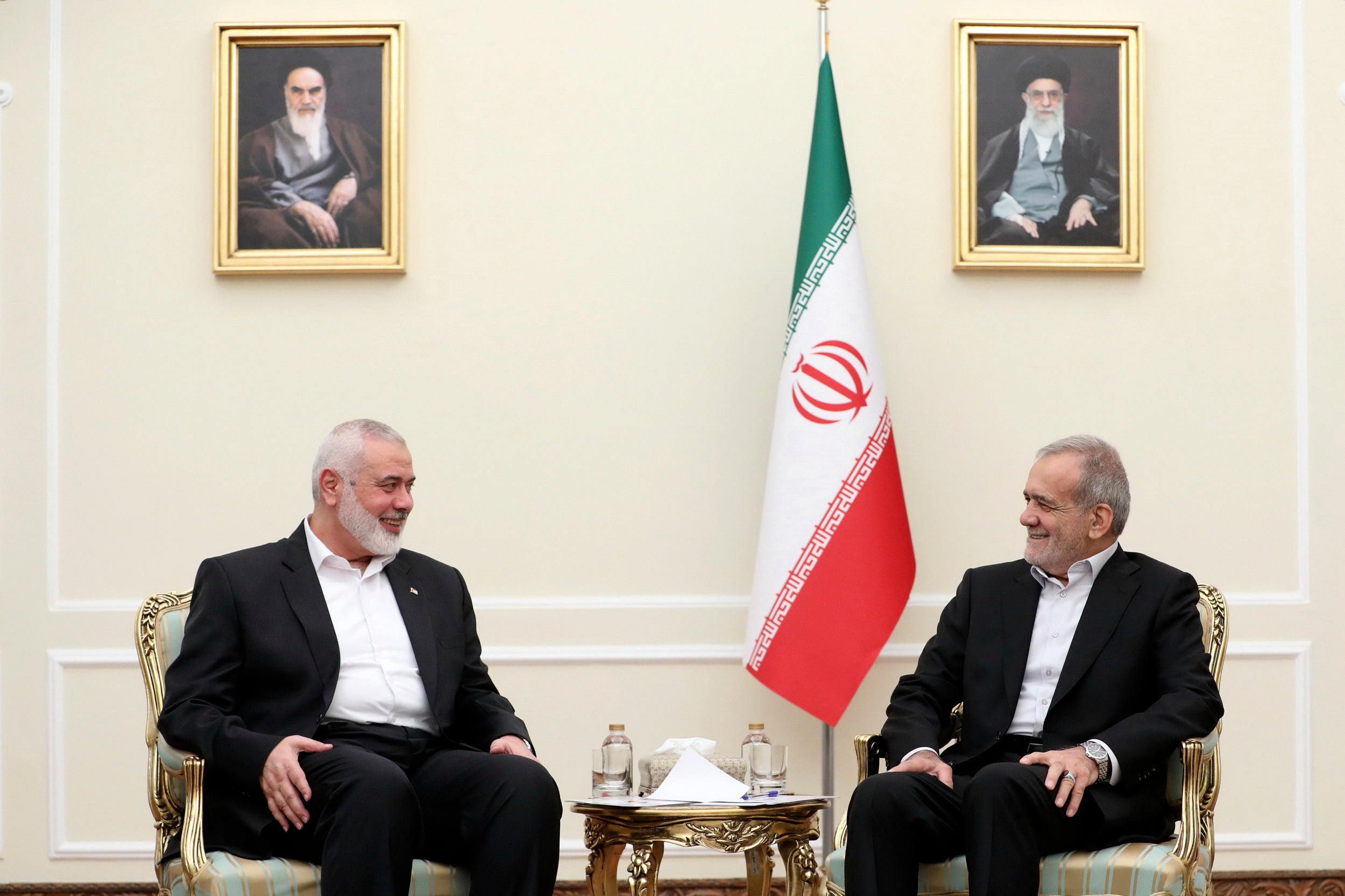Iran vows revenge after Hamas leader Ismail Haniyeh killed in Tehran
Fears of regional war rising as death came hours after Israel claimed to have killed a top Hezbollah commander in Beirut
Iran has vowed revenge for the assassination of Hamas’s political leader Ismail Haniyeh in an airstrike in Tehran, an attack that brings the Middle East to the brink of a region-wide war.
Haniyeh was in Tehran to attend the inauguration of Iran’s new president Masoud Pezeshkian. The assassination took place hours after Israel claimed to have killed a commander for Iran ally Hezbollah in the Lebanese capital Beirut in retaliation for a deadly strike in the Israeli-occupied Golan Heights.
Iran’s supreme leader Ayatollah Ali Khamenei vowed revenge for the killing of Haniyeh, saying Israel “prepared a harsh punishment for itself” by killing “a dear guest in our home”.
“We consider his revenge as our duty,” he said in a statement.
The Israeli government has been hunting Hamas leaders since the militant group attacked southern Israel on 7 October, killing more than 1,130 people and taking 251 hostages.
In April, Haniyeh said his three sons and three grandchildren had been killed in an Israeli airstrike in Gaza, where Israel’s war against Hamas has displaced more than 90 per cent of the population and killed more than 39,000 Palestinians, according to health officials in the Hamas-run strip.

Hamas has vowed to retaliate over Haniyeh’s death, calling it a “cowardly act” that will not “go unpunished”. Its armed wing said in a statement that Haniyeh’s killing would “take the battle to new dimensions and have major repercussions”. Vowing to retaliate, Iran declared three days of national mourning and said the US bears responsibility because of its support for Israel.
“The iron hand that will strike them, is the one that will bring peace and a little comfort and strengthen our ability to live in peace,” Israel’s heritage minister Amichay Eliyahu said in a post on X.
Mr Pezeshkian said Iran would defend its territorial integrity and dignity and make Iran “regret their cowardly act” after the attack, which will be seen as an embarrassment for the government and Iran’s security services.
Bitter regional rivals Israel and Iran risked plunging into war earlier this year when Israel hit Iran’s embassy in Damascus in April. Iran retaliated, and Israel countered in an unprecedented exchange of strikes on each other’s soil, but international efforts succeeded in containing that cycle before it spun out of control.
Hamas and Iran don’t want a regional war but there is a crime that should be punished, Hamas deputy chief in Gaza Khalil Al-Hayya said in a press conference in Tehran

Mahmoud Abbas, the president of the Palestinian Authority, condemned the Hamas leader’s killing as various Palestinian factions called for mass demonstrations. Russia, China and Qatar were among the nations that strongly criticised the assassination on Wednesday morning.
Haniyeh’s death came just hours after Israel claimed to have “eliminated” one of the top leaders of the Iran-backed militant group Hezbollah in an airstrike in Beirut, which it described as revenge for a rocket attack on the occupied Golan Heights that killed a dozen children.
Israel blames Hezbollah for Saturday’s attack, while the militants have strongly denied responsibility. Iran had warned against an attack on Lebanon to avoid further escalation of the conflict.
Haniyeh, 61, was the tough-talking face of the Palestinian group’s international diplomacy and previously served as the prime minister of Gaza. He left the strip in 2019 and operated between Turkey and Qatar’s capital Doha, escaping the travel curbs of blockaded Gaza and enabling him to act as a negotiator in ceasefire talks or to talk directly with officials in Iran.
Haniyeh was “leading the political battle for Hamas with Arab governments”, said Adeeb Ziadeh, a specialist in Palestinian affairs at Qatar University. “He is the political and diplomatic front of Hamas,” Mr Ziadeh told Reuters.
Haniyeh’s most likely successor is Khaled Meshaal, his deputy-in-exile who lives in Qatar, Hamas officials told Reuters. Under Meshaal, Hamas emerged as an ever more important player in the Middle East conflict due to his popularity and regional standing, analysts said. Meshaal narrowly survived an attempt on his life in Jordan ordered by Netanyahu in 1997.
The assassination could potentially harm US president Joe Biden’s push to broker a temporary ceasefire and hostage release deal between Hamas and Israel.
Qatar and Egypt, which have acted as mediators in ceasefire negotiations between Israel and Hamas, suggested on Wednesday that the killing of Haniyeh could jeopardise efforts to secure a truce in Gaza.
“Political assassinations and continued targeting of civilians in Gaza while talks continue leads us to ask, how can mediation succeed when one party assassinates the negotiator on the other side?”, Qatari prime minister Sheikh Mohammed bin Abdulrahman Al Thani wrote on X.
Sheikh Mohammed, who is also foreign minister, later spoke with the US secretary of state, Antony Blinken, over the phone and discussed continuing work towards a ceasefire.
Mr Blinken sidestepped a question on Haniyeh’s killing at an event in Singapore, saying a ceasefire deal in Gaza was key to avoiding wider regional escalation. He told Channel News Asia that the US had neither been aware of nor involved in the killing.
Egypt’s foreign ministry said in a statement that a “dangerous Israeli escalation policy” over the past two days had undermined efforts to broker an end to the fighting in Gaza.
“The coincidence of this regional escalation with the lack of progress in the ceasefire negotiations in Gaza increases the complexity of the situation and indicates the absence of Israeli political will to calm it down,” the statement said.
“It undercuts the strenuous efforts made by Egypt and its partners to stop the war in the Gaza Strip and put an end to the human suffering of the Palestinian people,” it added.
Britain’s foreign secretary, David Lammy, has warned against the destabilising impact of conflict in the Middle East on a visit to Qatar alongside the UK’s defence secretary, John Healey.
“Escalation and destabilisation are in no one’s interests,” Mr Lammy said during the visit. “It is absolutely vital that we engage closely with partners like Qatar, who play a key role in mediating the conflict in Gaza, so that we can bring this devastating war to an end.”
Separately, Brett McGurk, the White House coordinator for the Middle East and North Africa, is also in the region for talks with US partners.
Reuters contributed to this report
Join our commenting forum
Join thought-provoking conversations, follow other Independent readers and see their replies
Comments
Bookmark popover
Removed from bookmarks